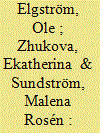|
|
|
Sort Order |
|
|
|
Items / Page
|
|
|
|
|
|
|
| Srl | Item |
| 1 |
ID:
161369


|
|
|
|
|
| Summary/Abstract |
This article compares media representations of how Europe and Russia handled the aftermath of the Chernobyl nuclear disaster in Belarus and Ukraine in the period 1992–2014. It shows that the official and alternative media in Belarus featured competing representations of Europe and Russia that were linked to the national narratives of the Belarusian authorities and opposition, while the official and alternative media in Ukraine carried congruent representations of Europe and Russia that were not linked to the competing national narratives of the political actors. It is further argued that while the media in Belarus constructed its national identity as present-oriented, the media of Ukraine presented its national identity as past-centred.
|
|
|
|
|
|
|
|
|
|
|
|
|
|
|
|
| 2 |
ID:
183708


|
|
|
|
|
| Summary/Abstract |
Drawing on the IR theories of norm translation and strategic narratives, this article focuses on how states translate international norms to their own advantage by producing strategic narratives to advance their soft power ambitions abroad. Using the example of feminist foreign policy (FFP), the article compares Sweden, Canada, France, and Mexico in their attempts to translate international feminist norms into their countries’ strategic narratives. This comparison is based on three strategic narrative types (issue, national, and international system narratives) and two types of feminism (liberal, intersectional). Issue narratives reveal that Sweden and Mexico give more priority to social policies, while France and Canada emphasise the role of the market in addressing gender inequality. International system narratives demonstrate that Sweden and Mexico perceive global challenges as drivers of gender inequality, while France and Canada see gender inequality as a cause of global problems. National narratives show that Sweden and Mexico refer to other FFP countries to ‘back up’ their feminist initiatives, while France and Canada do not relate to other states. Finally, while liberal feminism dominates all four FFPs, each state either prioritises particular aspects of it (legal, market, security, rights-based) or incorporates elements from intersectional feminism.
|
|
|
|
|
|
|
|
|
|
|
|
|
|
|
|
| 3 |
ID:
156550


|
|
|
|
|
| Summary/Abstract |
This article looks at how Belarus, the most affected state by the Chernobyl nuclear disaster, discursively constructs cooperation with foreign countries that provide help in combating the consequences of the tragedy. It shows that different representations of foreign actors handling the prolonged consequences of the Chernobyl nuclear disaster contribute to developing new friendships (with Japan), questioning existing cooperation (with Russia), and softening old (with Germany) and current (with Europe) conflicts in Belarus. The article makes a contribution to three debates in identity literature in constructivist International Relations: (a) identity and foreign policy; (b) the ‘voice’ and agency of the ‘Rest’; and (c) identity and difference. It is argued that when small non-Western states (help receivers) construct an ethical identity of bigger Western and non-Western states (help providers), they challenge the existing temporal and spatial identities of old strangers, enemies, and friends and create a new platform for conflict and cooperation.
|
|
|
|
|
|
|
|
|
|
|
|
|
|
|
|
| 4 |
ID:
184076


|
|
|
|
|
| Summary/Abstract |
This article brings the concept of kinning from anthropology and the sociology of adoption and care work to the study of disaster response and migration. It looks at intimate relationships between the Chernobyl children from Belarus and host families in Italy within the humanitarian programme of child recuperation abroad and argues that these relationships can be understood as kinning. Kinning implies intimate disaster response, a process of fostering transnational relations at a people-to-people level during humanitarian assistance independently of non-state, state, and supranational institutions. The manuscript shows that kinning with host families in childhood resulted in educational migration of the grown-up Chernobyl children to Italy in adulthood. The essay concludes that disaster response and migration studies can benefit from studying the private and the personal in order to understand the mobility trajectories of disaster survivors. This is important when disaster survivors are children and disaster response and migration overlap with coming of age.
|
|
|
|
|
|
|
|
|
|
|
|
|
|
|
|
|
|
|
|
|